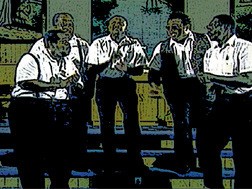
Too Close to Heaven: The History of Gospel Music 1997
Distributed by Films Media Group, PO Box 2053, Princeton, New Jersey 08543-2053; 800-257-5126
Produced by Leo St. Clair
Directed by Alan Lewens for the BBC
VHS, color, 3 parts, 51 min. each
Adult
Music
Date Entered: 11/09/2018
Reviewed by Richard McRae, Associate Librarian, University at Buffalo Music LibraryAfrican-American gospel music is a vibrant and integral force in American culture, spanning three centuries of history. Its African origins, development, elements, and social and political significance is detailed in this superb video series, originally produced for BBC broadcast. Musical and religious traditions from Africa merged with Christianity during the slave era, and the resulting work-songs and spirituals provided solace, communal support, and a shared sense of hope for the sufferers of slavery. In the post-Civil War era, the church remained the center of African-American social and political life, and the content of gospel lyrics began to include some current commentary. The transformation of gospel music progressed from concert choirs such as the Fisk Jubilee Singers, to the rise of a capella quartets of both genders, and the eventual emergence and immersion of gospel into the popular music sphere.
Pioneer composers and performers who shaped the music such as Thomas A. Dorsey, Mahalia Jackson, Rev. James Cleveland and Shirley Caesar are profiled in the second part of the series. Gospel historians, most notably Horace Boyer and Margaret P. Douroux, provide lively commentary on performance practice and African elements of gospel. Rev. Jesse Jackson adds insightful comments about the music's social and political relevance. Several older gospel musicians reminisce about their careers and the importance of gospel to the black community.
The third part of the series discusses contemporary gospel music, which incorporates elements of funk, rap, and other current black music styles. Andrae Crouch, Kirk Franklin and others discuss their attempts to reach younger audiences by modernizing gospel. The issue of crossing over to wider audiences has been controversial within the gospel community since the early 1960, as illustrated by the enormous popular success of Sam Cooke and Aretha Franklin after their earlier careers as purely gospel singers. Traditionalists feared that the Christian messages of gospel would be obscured by the glamorous aspects of secularism. The performance footage in this part is more stylized: the quick cuts and camera movements resemble MTV music videos. Although this footage seems to effectively illustrate crossover, it is quite distracting, and deters from the music's impact. The producers do not reveal their own biases on the traditional vs. contemporary debate, and the series ends in a disappointingly vague and inconclusive manner.
Despite this, the series is well-produced and researched, and the footage of performances in churches and concert halls is generally outstanding. They convey the heightened spiritual and emotional connection between musicians and congregation during worship, perhaps more powerfully than any written description could provide. Too Close to Heaven is highly recommended for academic libraries with strong collections in music, American history and African-American studies.